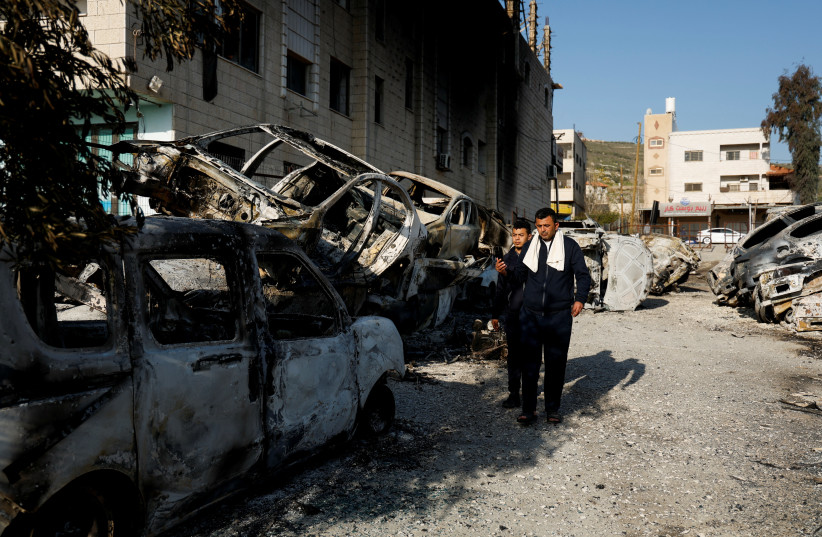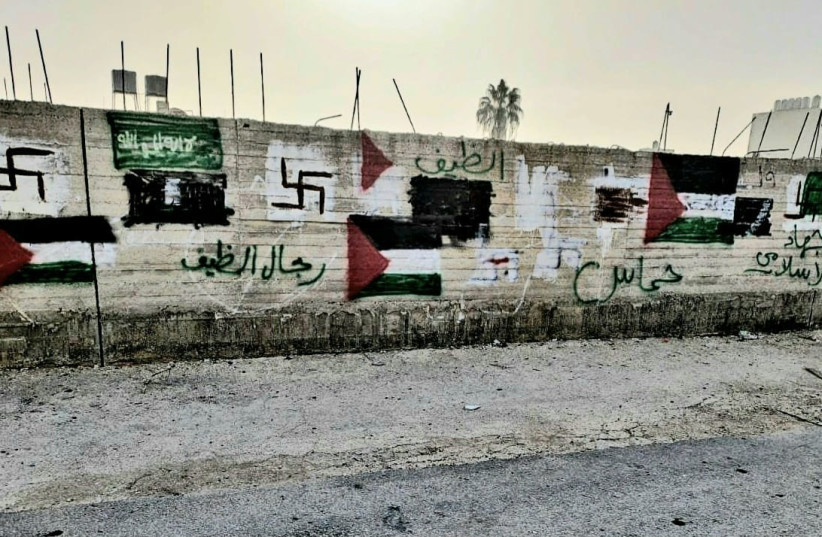As the war in Gaza continues, tensions in the West Bank are reaching a boiling point, according to a report in the New York Times.
Since the war with Hamas began on October 7, Palestinian-owned shops in Huwara, the West Bank, have been shuttered, and roads have been closed by the IDF. A Palestinian shop owner showed the NYT reporter the total of NIS 130, or about $35, that remains in his cash register, with Al Jazeera playing in the background.
The NYT reporter described the images on Al Jazeera as a hypnotic, incessant reel of children dying, flattened homes, dazed Gazans sobbing, dust and debris, and desperation and death. The reporter said that this is the “daily diet of Palestinian rage.”
The shop owner said, “We are caught. [National Security Minister Itamar] Ben-Gvir arms the settlers with automatic weapons and tells them to do what they like, and where are we supposed to go?”
Palestinians in Huwara recently maneuvered a front-end loader back and forth to clear rocks and rubble that the IDF used to block the roads so they could move more freely throughout the city. Sami Sosa, an American citizen living in Huwara, believes that the IDF will rebuild the barrier, reported the New York Times.

In Huwara, tensions have always been high. Yitzhar, a Jewish settlement with a population of 2,000, is on a hill above Huwara. On October 5, a 28-year-old Palestinian named Jamal Mahmoud Majdoub opened fire on a Jewish couple driving down Huwara’s main street. The couple escaped unharmed, but the Jewish residents of Yizhar retaliated, shooting dead a 19-year-old Palestinian, Labib Dumedi, the next day.
In February 2023, in response to Palestinian terrorists murdering two Israeli brothers, Jewish residents violently rampaged through Huwara, torching cars, homes, and businesses to the ground.
Since October 7, tensions have only increased. The New York Times describes the players in this situation as a weakened Palestinian Authority, a voiceless Palestinian people, armed settlers living in explosive proximity to three million Palestinians, and an Israeli military and the armed settlers with an ambiguous mission coexisting in the vacuum of putative but ever-more-inconceivable Palestinian statehood. Palestinians in Huwara view the IDF as the settler’s army.
The Palestinian prime minister, Mohammad Shtayyeh, said of the situation to the New York Times, “I have never seen such a terrible situation since I became aware of this Palestinian-Israeli reality.” Shtayyeh directs policies set by Abbas. “We are not far from an explosion. Israel has lost balance and is behaving like a wounded bull. They’re acting in a mood of revenge, killing for the sake of killing.”
Continuous back and forth between Israelis and Palestinians in Huwara
After the violence on October 5, hundreds of Palestinians gathered to mourn the death of the killed Palestinian Dumedi. Zvi Sukkot, an Israeli from Yizhar and a member of the Knesset, erected a Sukkah on Huwara’s main street, which acted as a roadblock.
“As a member of the Knesset, my role is to ensure security, so I put up the sukkah,” Sukkot told the New York Times. “Jewish presence anywhere is not a reason for violence. An Israeli couple had been attacked.”

Of his home in Yitzhar, he told the New York Times that he stands at the place where God’s promise of the land to Abraham was made. “This is where the Jews became a people. Of course, we belong here.” Residence in the West Bank is highly controversial. His wife said that when her father came to live in the northern part of the West Bank, he “saw the Bible before his eyes.”
Her father was killed by Palestinian terrorists in Nablus at the beginning of the second intifada in 2000 while visiting Joseph’s Tomb when he was 36. She told the NYT, “We always knew we were facing people who are killers. Nobody listened to us. It's hard to grasp the magnitude of October 7, but it's not a surprise to me. We left Gaza in 2005, and look what happened. If we left here, the same thing would happen in Tel Aviv.” The Sukkots believe that Palestinian terrorists do not care about the settlements in the West Bank but will only be satisfied with having the whole state of Israel, and even the whole world, and without Jews.
When the reporter asked the Sukkots about the three million Palestinians in the West Bank wanting the same land and frequently getting displaced, they responded, “What should Palestinians do? Go to work, raise their children, and if they could stop killing us, that would be great! There is no reason to kick anyone out, but if someone fights us, we won’t apologize for fighting bank.”
Discussions with Palestinian residents of Huwara
In Nablus, the NYT interviewed Sara Abdullah, a 26-year-old who carried out a potentially suicidal attack on Israelis at the southern Huwara checkpoint on June 9. “Nobody told me to do it – I decided because I was so angry about what had happened. I chose Huwara because it is close, and there are many Israeli settlers and Jews at the checkpoint.”
Abdullah described their lives as Palestinians as “children without a childhood, young men without prospects, living a life of harassment and humiliation.” She says that it is evident that in these circumstances, people will consider risking their lives to attack Israel. She told the New York Times that every Palestinian family has relatives imprisoned, killed, or maimed by Israel.
She said, “There are so many children who have no mother or father because of the occupation. They would have grown up to be proud of what their mother had done.” She stabbed a female Israeli soldier at the checkpoint in Huwara as close to the neck as she could. The soldier pushed her away, and the blade did not penetrate deeply.
Abdullah is facing a possible eight-year sentence. On October 7, she and her family celebrated “like any Palestinian.” She was freed from prison in an exchange of Israeli hostages in Gaza and Palestinian prisoners. Abdullah told the New York Times that she would not do what she did again because she suffered a lot. She said that she is “proud” that Hamas forced Israel to release them and that “Israel had all the power before. Who cares that a lot of their civilians were killed?”
Her uncle interjected in the interview and said, “No. Some Israelis are human, and I hope we can live with them one day. I am happy to talk about our future. But when they elect a right-wing fascist government, it becomes difficult.”
Abdullah said, “We will continue to be knives in their necks. We cannot share the land. We did not come and break down the door and take their homes.” She says that she is waiting for her land to be liberated.
Her uncle insisted, “The bloodshot on both sides is wrong. But they don’t want peace. Who killed Rabin? Us or them?”
While speaking with the owner of a small supermarket in Huwara, the owner, Ahmad Odeh, told the New York Times regarding the terror attack on October 7, “When I saw what was happening, happiness filled my entire body, even if all of Gaza is destroyed. I was happy because of everything done to us and our children in Jenin, in Nablus, in Tulkarm, in Ramallah. But this won’t change anything in the conflict. The achievement will be zero.”
The New York Times reporter said that not a single Palestinian in the West Bank would offer unequivocal condemnation of the Hamas terrorist attack on October 7, and believes that October 7, 2023, will go down in Palestinian history, as a day of liberation as a day of heroic resistance to occupation.
For Israelis, the day will be commemorated as a Palestinian crime against humanity that summoned from the collective Jewish subconscious images of Jew slaughter through the ages, culminating in the Holocaust, the New York Times reported.
